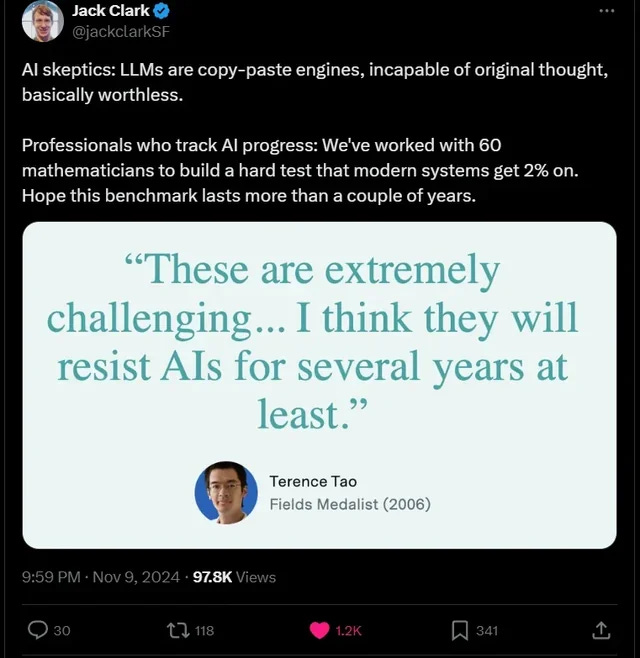Everything is Obvious in Retrospect (078)
Jump on the AI maximalist bandwagon.
Happy Monday and welcome to your weekly download of (human) perspectives about what machines are up to.
Had you told me two years ago that I’d be spending around $100 each month on AI tools, I would probably not have believed you. Today, I consider the investment a minimum for staying on top of what is even possible.
My needs are likely different from yours, but the sheer amount of value I am getting from having access to a half-dozen specialized state of the art apps at my disposal is staggering. Some of these apps might be consolidated as model capabilities progress, yet I suspect the opposite will happen, where more and more valuable edge cases will pop up and make possible things I haven’t dreamed of.
You don’t have to run a company to appreciate their utility, and while my individual needs don’t necessarily apply to you, here is my attempt at justifying the business expenses that keep on giving.
Cursor an unbelievably powerful code editor with deep LLM integration. By asking the right questions even a non-developer like myself has managed to build a handful of legitimate web apps. ($20/month)
Chat as OpenAI is apparently rebranding their generative pre-trained transformer is the OG. I don’t use it nearly as much as Claude nowadays but the native desktop app and voice mode are areas where others have to catch up. ($20/month)
Claude became my favorite chat app in 2024. Maybe it’s the mellow color scheme, or perhaps the smart approach for managing projects, but I find myself asking Claude most things today. If the ‘new’ Sonnet 3.5 feels like a 4.0 release, I can only imagine what’s brewing at Anthropic. ($20/month)
Raycast is a slick launcher for your computer with built-in chat. I use it mostly for simple questions suited for GPT-4o-mini or Claude 3.5 Haiku. ($10/month for pro service, not AI in particular).
Poe is the best way of testing new models, especially image, video and open-source ones. For me things means using Flux Pro and Ideogram, but also experimenting with Gemini’s longer context windows and testing open-source models like Llama and Mistral. ($20/month)
Granola feels like a superpower for someone who spends hours every day in meetings. It runs locally on your computer to transcribe and summarize conversations around your notes. It’s truly a centaur approach for intelligence augmentation. ($10/month)
GitHub CoPilot complements my Cursor needs for niche things like describing code commits, but I know GitHub is working on increasing its capabilities to take on Cursor. ($10/month)
Ongoing API costs: I spend between a coffee and a lunch every month on various API costs for automated projects like the Vocab.
I hope this is useful.
Until next week,
MZ
Found on X.
Autonomous machines (10 min)
Yuval Noah Harari shares his thoughts on high-EQ AIs making money in the near future.
Disruptive AI pricing models
Via Sandeep.
Sam Altman and Garry Tam (45 min)
Superficial but valuable interview on YC about the near future of AI and what it means to achieve general intelligence.
Agentic Futures (30 min)
Insightful lecture about agentic futures and the possible trajectories of ML by Bridgewater chief AI scientist. Technical & strategic.
LLMs are knowledgeable but lack agentic behavior—they can't plan or think step-by-step, making them unsuitable as drop-in workers for complex, sustained tasks.
Building an AI brain (1h)
Spectacular podcast interview about building apps & tools with LLMs (don't try to build one big monolith but break out small very specific automations).
Decoding Machine Learning (2h)
Anil Ananthaswamy, author of Why Machines Learn, unpacks the elegant mathematics behind AI and its pattern-matching capabilities. He emphasizes the need for broader societal understanding of AI’s limitations and potential, advocating for informed engagement to guide its responsible use.
It's only when we understand the math that we can see machines are doing sophisticated pattern matching, not reasoning.
Book Club
After listening to Ananthaswamy's interview on Machine Learning Street Talk (above), I started reading his recent book and am confident I'll make it through it despite my rusty high school math. If you want to join a book club of sorts please DM to join our small cohort of fans.
Seeking spirituality among AI (45 min)
Surprisingly insightful interview with Deepak Chopra on some of his perspectives about the intelligence explosion we are experiencing.
Envisioning Vocab
I have been experimenting with collecting different quantitative aspects of each vocab term in order to look for groupings or clusters.
You can explore generative measurements for things like popularity (how many people use it), safety (how important it is from a risk perspective), generality (how fundamental it is to the field) and a few other methods. Read more about the methodology. Very cursory and simplistic but results in an interesting way of navigating the index.
Anthropic founder Jack Clark says AI skeptics are poorly calibrated as to the state of progress.
From the A24 movie Heretic, via X.
If Artificial Insights makes sense to you, please help us out by:
📧 Subscribing to the weekly newsletter on Substack.
💬 Joining our WhatsApp group.
📥 Following the weekly newsletter on LinkedIn.
🦄 Sharing the newsletter on your socials.
Artificial Insights is written by Michell Zappa, CEO and founder of Envisioning, a technology research institute.
You are receiving this newsletter because you signed up on envisioning.io or Substack.








